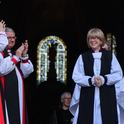On the day the October 2022 issue of Prospect was published, Whyatt received a message from the FA to say she and her teammates will finally receive their caps—when the Lionesses play the USA at Wembley next month
On 4th July, two days before the England women’s team played their first match in the Uefa European championships, Sue Whyatt sent a text to the BBC’s Woman’s Hour. A former goalkeeper in the very first England women’s football team in 1972, she told the programme that she and her teammates had never been recognised by the FA with their official England caps.
The presenter Emma Barnett invited Whyatt onto the show to discuss this snub; the Labour MP Barbara Keeley then raised it in parliament. The next day the FA made a statement promising to right the historical wrong and give the pioneers their caps. By the end of the month, the women’s game had been changed forever by the 2022 Lionesses’ momentous win.
Whyatt tells me she was an aggressive goalkeeper, but she is a ball of sunshine when she picks me up from Macclesfield train station. She feels lucky, she says, to have lived in the town for most of her life, except for a brief stint in Scotland. Her children and grandchildren are just down the road. As we drive to her house, we both admire the hills on the horizon, where Whyatt often walks.
Growing up on a nearby council estate, Whyatt got into the sport as a young child, at the height of football fever after the 1966 World Cup—she recalls playing on the street with the boys. She used to wait outside the Boys’ Brigade meetings all evening for the chance to play. The Brigade leaders would eventually say, “for goodness’ sake, come in and have a game.” She was a natural goalkeeper: “You’ve got to have quite a strong personality, really, and you’ve got to command your area.”
Whyatt was only 16 when selected for the first official national team, a year after the FA lifted its 50-year ban on the women’s game in 1971. She was picked for the 15-strong squad as a reserve goalkeeper after saving three penalties in the final round of the trials, in what she calls a “possibles versus probables’’ match. She credits her performance to a piece of advice from her hero Gordon Banks: by leaving a bigger space in front of the goal on her stronger side, her opponents would kick the ball to it. The trick worked, and from a “possible” Whyatt became a definite, first appearing on the pitch for England in a match against Scotland in Nuneaton. England won.
On tour, the team got up to all sorts: sneaking out to see the red-light district in Amsterdam, shimmying down a fire escape to go clubbing in Bath and dancing with the Middlesbrough men’s team on a training weekend at Bisham Abbey.
But Whyatt and her teammates couldn’t earn money from football—the national team even had to return their kit bags at the end of each match. At 19, she joined Cheshire police to earn a living. Despite assurances, she was forced to give up football as, unlike male officers, she wasn’t allowed time off to play.
Now retired, Whyatt was thrilled by the performance of the Lionesses in the Euros: “I just thought they were absolutely brilliant, and that goal by Georgia Stanway, absolute scorcher!” But despite the FA’s statements to the media, Whyatt says she and her teammates have received no communication about when they will receive their caps. One of her fellow pioneers, Sylvia Gore, died without being honoured by the FA, and another member of the team is in a care home suffering from -dementia: “How much longer are [the FA] going to wait?”
She has a picture of the 1972 team on her living room wall, as well as an unofficial cap. She will not stop until every member of her team has the real one they deserve. But she is getting tired: “I feel like all my life I’ve been fighting, and we’re still fighting now… sometimes you just think, ‘I’m fed up with fighting.’”













